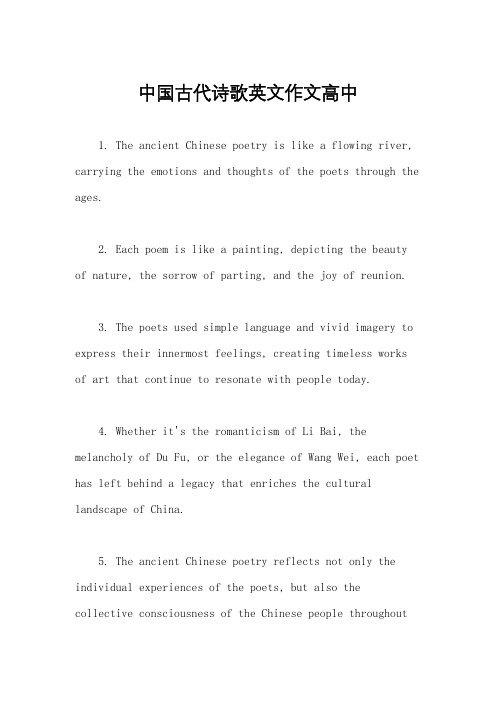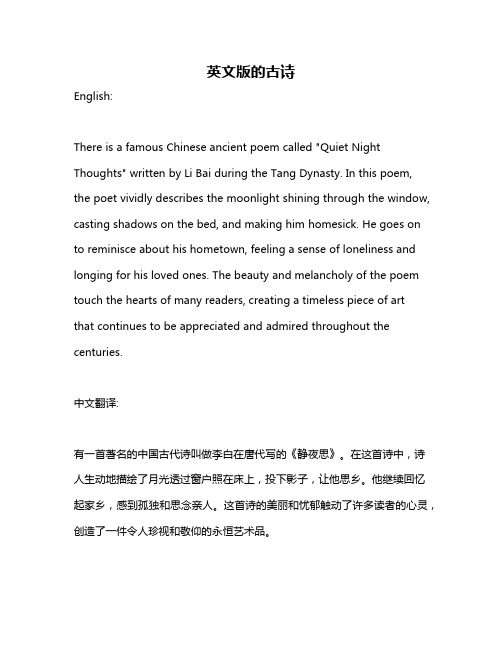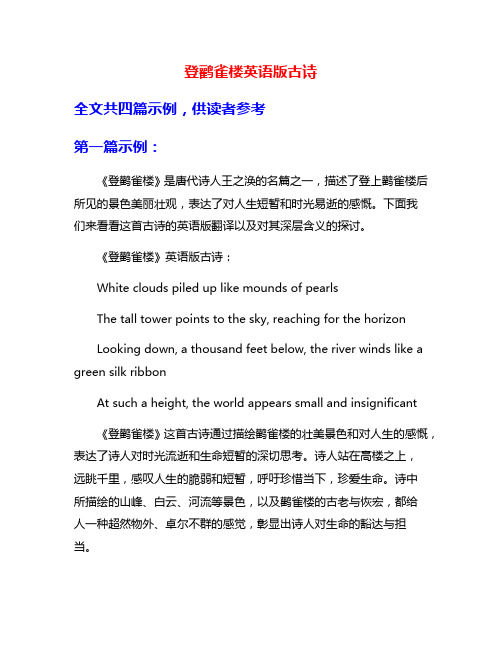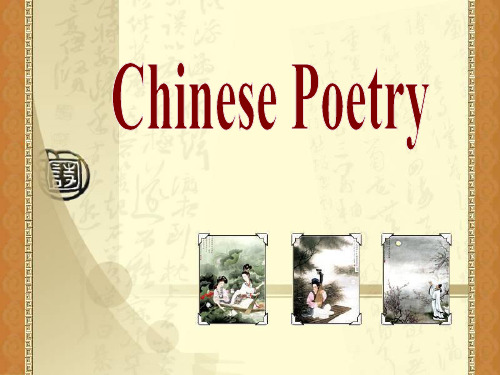英文版中国古代诗歌
中国古代诗歌英文作文高中

中国古代诗歌英文作文高中1. The ancient Chinese poetry is like a flowing river, carrying the emotions and thoughts of the poets through the ages.2. Each poem is like a painting, depicting the beauty of nature, the sorrow of parting, and the joy of reunion.3. The poets used simple language and vivid imagery to express their innermost feelings, creating timeless works of art that continue to resonate with people today.4. Whether it's the romanticism of Li Bai, the melancholy of Du Fu, or the elegance of Wang Wei, each poet has left behind a legacy that enriches the cultural landscape of China.5. The ancient Chinese poetry reflects not only the individual experiences of the poets, but also thecollective consciousness of the Chinese people throughouthistory.6. Through the verses, we can glimpse into the social, political, and cultural aspects of ancient China, gaining a deeper understanding of the country's rich heritage.7. The rhythmic and melodic qualities of the poetry also make it a delight to recite and listen to, adding an extra layer of enjoyment to the reading experience.8. In today's fast-paced world, the timeless wisdom and beauty of ancient Chinese poetry continue to inspire and captivate readers around the globe.。
中国古诗英语版十首

中国古诗英语版十首1、登幽州台歌陈子昂前不见古人,后不见来者。
念天地之悠悠,独怆然而泪下。
Where the sages of the past, And those of future years? Sky and earth forever last, Lonely,I shed sad tears.2、天净沙·秋思马致远枯藤老树昏鸦,小桥流水人家。
古道西风瘦马,断肠人在天涯。
Over old trees wreathed with rotten vines fly evening crows;Under a small bridge near a cottage a stream flows; One ancient road in the west wind a lean horse goes. Westward declines the sun; Far,far from home is the heartbroken one.3、寻隐者不遇贾岛松下问童子,言师采药去。
只在此山中,云深不知处。
I ask your lad neath a pine-tree,“My master’s gone for herbs,” says he.You hide amid the mountains proud,I know not where deep in the cloud.4、江雪柳宗元千山鸟飞绝,万径人踪灭。
孤舟蓑笠翁,独钓寒江雪。
From hill to hill no bird in flight, From path to path no man in sight.A lonely fisherman afloat, is fishing snow on lonely boat.5、独坐敬亭山李白众鸟高飞尽,孤云独去闲。
相看两不厌,只有敬亭山。
All birds have flown away,so high, A lonely cloud drifts on,so free. Gazing on Mount lingting,nor I, Am tired of him,nor he of me.6、问刘十九白居易绿蚁新醅酒,红泥小火炉。
村晚宋雷震古诗英文版

村晚宋雷震古诗英文版English:"Village Evening" is a famous ancient Chinese poem written by Song Leshen. The poem vividly describes the scene of a village evening, with the sunset casting long shadows and the evening bells ringing through the air. The poet uses rich and vivid language to portray the peaceful and serene atmosphere of the village, with the smoke rising from the kitchen chimneys and the sound of the river flowing in the distance. The poem also touches upon the theme of nostalgia, with the poet reminiscing about the simple and pure life in the village. Overall, "Village Evening" is a beautiful and evocative poem that captures the essence of rural life in ancient China.中文翻译:《村晚》是宋乐深的一首著名古代中国诗歌。
这首诗生动地描绘了一个村庄夜晚的场景,夕阳投下长长的影子,晚钟在空中回响。
诗人运用丰富生动的语言描绘了村庄宁静和安详的氛围,厨烟袅袅而起,远处传来河水流淌的声音。
诗歌还触及怀旧的主题,诗人怀念村庄里简单纯朴的生活。
必读必背 中国古诗词英文诗歌1

To be, or not to be William Shakespeare[Hamlet]To be, or not to be: that is the question: Whether 'tis nobler in the mind to suffer The slings and arrows of outrageous fortune,Or to take arms against a sea of troubles, And by opposing end them. To die: to sleep;No more; and by a sleep to say we end The heart-ache, and the thousand natural shocksThat flesh is heir to, 'tis a consummation Devoutly to be wish'd. To die, to sleep; To sleep: perchance to dream: aye, there's the rub;For in that sleep of death what dreams may come,When we have shuffled off this mortal coil,Must give us pause: there's the respect That makes calamity of so long life;For who would bear the whips and scorns of time,The oppressor's wrong, the proud man's contumely,The pangs of despised love, the law's delay,The insolence of office, and the spurns That patient merit of the unworthy takes, When he himself might his quietus make With a bare bodkin? who would these fardels bear,To grunt and sweat under a weary life, But that the dread of something after death,The undiscover'd country from whose bournNo traveler returns, puzzles the will, And makes us rather bear those ills we haveThan fly to others that we know not of? Thus conscience does make cowards of us all,And thus the native hue of resolutionIs sicklied o'er with the pale cast of thought,And enterprises of great pitch and momentWith this regard their currents turn awry And lose the name of action.哈姆莱特生存还是毁灭,这是一个值得考虑的问题;默然忍受命运的暴虐的毒箭,或是挺身反抗人世的无涯的苦难,通过斗争把它们扫清,这两种行为,哪一种更高贵?死了;睡着了;什么都完了;要是在这一种睡眠之中,我们心头的创痛,以及其他无数血肉之躯所不能避免的打击,都可以从此消失,那正是我们求之不得的结局。
英文版的古诗

英文版的古诗
English:
There is a famous Chinese ancient poem called "Quiet Night Thoughts" written by Li Bai during the Tang Dynasty. In this poem, the poet vividly describes the moonlight shining through the window, casting shadows on the bed, and making him homesick. He goes on
to reminisce about his hometown, feeling a sense of loneliness and longing for his loved ones. The beauty and melancholy of the poem touch the hearts of many readers, creating a timeless piece of art
that continues to be appreciated and admired throughout the centuries.
中文翻译:
有一首著名的中国古代诗叫做李白在唐代写的《静夜思》。
在这首诗中,诗人生动地描绘了月光透过窗户照在床上,投下影子,让他思乡。
他继续回忆起家乡,感到孤独和思念亲人。
这首诗的美丽和忧郁触动了许多读者的心灵,创造了一件令人珍视和敬仰的永恒艺术品。
简单的英文版中国古诗

简单的英文版中国古诗In the quiet of the night, as the moon ascends high, its silver light spills across the land, echoing the luster of ages past. This is the world of ancient Chinese poetry, where every word is a brushstroke painting emotions and scenes from a time long gone yet vividly alive in the heart of the culture.Ancient Chinese poets wandered through this landscape of emotion and nature, their words a testament to the profound connection between humanity and the world around us. They spoke of mountains shrouded in mist, of rivers flowing like endless thoughts, and of the solitary moon witnessing the joys and sorrows of countless generations.One such poet, Li Bai, known for his love of the moon and wine, wrote with a freedom and ease that belied the depth of his contemplation. His poem, "Quiet Night Thoughts," reflects on the loneliness and distance from home, the moonlight casting a bridge across time and space, connecting him to his family far away.Du Fu, another master of the craft, often wrote of the harsh realities of life, his works serving as a chronicle of the times. His poetry, rich with social commentary and empathy for the common people, paints a picture of the world he lived in, one that was not always kind but was always real.Wang Wei, with his hermit-like existence and Buddhist leanings, found solace and enlightenment in the natural world. His verses are tranquil and introspective, inviting the reader to look inward and find peace in the simplicity of nature.These poets and many others form the tapestry of ancient Chinese poetry, each thread a narrative of life's fleeting beauty and the enduring human spirit. Their words, though centuries old, resonate with a timeless quality, speaking to the universal experiences of love, loss, joy, and reflection.The legacy of these poets is not just in the words they left behind but in the influence they've had on generations of writers and thinkers. Their poetry transcends borders anderas, inviting all who read them to partake in a journey of the soul, one that leads to a deeper understanding of ourselves and the world we share.As we delve into the simple yet profound world of these ancient verses, we find that despite the passage of time, the emotions and thoughts expressed are as relevant now as they were then. The human experience, with all its complexity and wonder, is captured in the lines of their work, offering a window into the past and a mirror reflecting our own lives.In studying these poems, we not only gain insight into the rich cultural heritage of China but also connect with the poets who, with a few well-chosen words, could evoke the most profound of feelings. Their poetry serves as a reminder of the power of language and the enduring nature of human expression.Through the simple elegance of ancient Chinese poetry, we are reminded of the beauty that exists in the world and within ourselves. It is a beauty that endures, unmarred by time, a testament to the indomitable spirit of humanity and the art that arises from it. As we continue to read and appreciate these works, we carry forward the legacy of the poets, ensuring that their voices, like the moon's gentle glow, will never fade into the silence of history. 。
登鹳雀楼英语版古诗

登鹳雀楼英语版古诗全文共四篇示例,供读者参考第一篇示例:《登鹳雀楼》是唐代诗人王之涣的名篇之一,描述了登上鹳雀楼后所见的景色美丽壮观,表达了对人生短暂和时光易逝的感慨。
下面我们来看看这首古诗的英语版翻译以及对其深层含义的探讨。
《登鹳雀楼》英语版古诗:White clouds piled up like mounds of pearlsThe tall tower points to the sky, reaching for the horizonLooking down, a thousand feet below, the river winds like a green silk ribbonAt such a height, the world appears small and insignificant《登鹳雀楼》这首古诗通过描绘鹳雀楼的壮美景色和对人生的感慨,表达了诗人对时光流逝和生命短暂的深切思考。
诗人站在高楼之上,远眺千里,感叹人生的脆弱和短暂,呼吁珍惜当下,珍爱生命。
诗中所描绘的山峰、白云、河流等景色,以及鹳雀楼的古老与恢宏,都给人一种超然物外、卓尔不群的感觉,彰显出诗人对生命的豁达与担当。
这首古诗的英语翻译通过优美的语言和抒情的笔调,将原诗的意境和情感传达得淋漓尽致。
诗中用白云如珍珠、太阳洒金般的描写,让人仿佛置身仙境,感受到大自然的奇妙与壮美。
诗人通过对自然景色和人生的观察,和人们分享了他的感慨和思考,引发读者对生命的反思和珍惜。
王之涣的《登鹳雀楼》是一首具有深刻内涵和艺术价值的古诗,它通过对自然景色和人生的描绘,表达了诗人对生命和时光的思考,引导人们珍惜当下,珍爱生命。
无论是中文版还是英语版,这首古诗都值得我们深入品味和领会,感受其中的诗意与哲理,从中汲取力量和启示。
愿我们都能像诗中的鹳雀楼一样,笔直直立,矗立在自己心中的高处,永远坚强和自信。
第二篇示例:《登鹳雀楼英语版古诗》是中国唐代诗人王之涣创作的一首脍炙人口的名篇。
Chinese-Poetry-中国诗歌介绍-英文版

关雎
关关雎鸠,在河之洲。窈窕淑女,君子好逑。 参差荇菜,左右流之。窈窕淑女,寤寐求之。 求之不得,寤寐思服。悠哉悠哉,辗转反侧。 参差荇菜,左右采之。窈窕淑女,琴瑟友之。 参差荇菜,左右毛之。窈窕淑女,钟鼓乐之。
2021/5/27
4
2021/5/27
5
Classical Chinese poetry
• A second, more lyrical and romantic anthology was Chu Ci (楚辞 "Songs of Chu"), made up primarily of poems ascribed to Qu Yuan and his follower Song Yu. These poems are composed of li2n02e1s/5/o27f irregular lengths, in the style prevalent in the state of C3hu.
7
Classical Chinese poetry
五言绝句(五绝) 《江雪》 绝句
七言绝句(七绝)
近
- 1、下载文档前请自行甄别文档内容的完整性,平台不提供额外的编辑、内容补充、找答案等附加服务。
- 2、"仅部分预览"的文档,不可在线预览部分如存在完整性等问题,可反馈申请退款(可完整预览的文档不适用该条件!)。
- 3、如文档侵犯您的权益,请联系客服反馈,我们会尽快为您处理(人工客服工作时间:9:00-18:30)。
• Finally,this period saw the rise of vernacular literature, particularly drama and novels,which increasingly became the main means of cultural expression.
The Tang Dynasty
Poems have five or seven characters in a line,with a caesura before the last three characters of each line. They are divided into the original gushi (old poems) and jintishi,a stricter form developed in the Tang dynasty with rules governing tone patterns and the structure of the content.
The Han Dynasty
The Chu lyrics evolved into the Fu,a poem usually in rhymed verse except for introductory and concluding passages that are in prose,often in the form of questions and answers. Emperor Wu created a music bureau,called “Yue fu”,to collect and record ceremonial chants,but also the songs and ballads of ordinary people.
Reasons
• Firstly,Chinese literary culture remained in awe of its predecessors,both writers and readers expected that new works would not bear comparison with the earlier masters. • Secondly,these later poets produced work which was ever more refined and allusive; the resulting poems tend to seem precious or just obscure to modern readers. • Thirdly,the increase in population,expansion of literacy and wider dissemination of works made it difficult to identify and properly evaluate those good pieces
• The Han Dynasty
• The Eastern HБайду номын сангаасn
Fu and Yue fu
poems with five characters to a line
• The Tang Dynasty
Shi original gushi (old poems) and jintishi Ci
San Qu
春闺 作者:匡燕 东风袅袅醉芳菲,孤燕寻春误入帏。 恍记池边新柳色,双襟衔得锦书归。
咏春 作者:匡燕 潋滟前湖二月中,柔情不与去年同。 东风借问香多少,布谷声声漫野红。
The Song Dynasty
Towards the end of the Tang dynasty,the Ci lyric became more popular. In the Song dynasty,Ci often expressed feelings of desire,often in an adopted persona,but the greatest exponents of the form (such as Su Shi) used it to address a wide range of topics.
Chinese Literature -- Ancient Poetry
Lecturer : Kuang Yan Major : Ancient Chinese Literature
OUTLINE
AGE • The Zhou Dynasty Form Of Ancient Poetry North The Book Of Songs South Chu Ci
The Yuan Dynasty
After the song dynasty ,San Qu,a freer form,based on new popular songs,developed. The use of San Qu songs in drama marked an important step in the development of vernacular literature.
The Eastern Han
Poems with five characters to a line appeared. The development was found to be a more rewarding measure,permitting a smoother and more melodious effect and the evocation of subtler human feelings.
• The Song Dynasty
• The Yuan Dynasty
The Zhou Dynasty
In the north :The Book Of Songs • It is the first comprehensive anthology of Chinese poems including 305 poems of the Zhou Dynasty . • Each poem in The Book of Songs was set to music and could be sung . • These poems are classified into folk songs,ceremonial songs and sacrificial songs . In the south : Chu Ci By the 4th century B.C. China's boundaries had expanded to include the vast area of the Yangtze river valley,people in Chu produced their own type of song, which are more lyrical and romantic and was compiled under the name of the Chu Ci.
黄梅戏《长亭送别》
After the Song dynasty,both Shi poems and lyrics continued to be composed until the end of the imperial period. However, these works have always been less highly regarded than those of the Tang dynasty.
